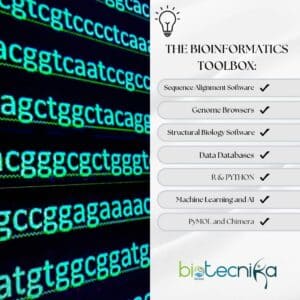The Role of Bioinformatics in Biotech Careers: A Comprehensive Guide
In the ever-expanding universe of biotechnology, where science and technology converge to shape the future of medicine, agriculture, and environmental conservation, there exists a powerful ally—bioinformatics. This interdisciplinary field serves as both a navigator and a magnifying glass, enabling scientists and researchers to decipher the intricate codes of life itself. In our comprehensive guide, we will embark on a journey to uncover the profound role of bioinformatics in biotech careers, from unraveling the mysteries of DNA to designing life-saving drugs and beyond.
As the biotech industry continues to redefine the boundaries of what’s possible, bioinformatics stands at the intersection of biology and computational science, harnessing the incredible potential of data-driven discovery. Whether you’re a recent graduate seeking a path in biotechnology or an experienced professional looking to amplify your impact, understanding the multifaceted role of bioinformatics is your gateway to a world of possibilities.
Join us as we explore the depths of this fascinating field, unravel its complexities, and reveal the myriad career opportunities it offers in the biotech realm. From decoding the genome’s secrets to revolutionizing personalized medicine, bioinformatics is your compass to navigate the ever-evolving landscape of biotech careers.
Understanding Bioinformatics: The Fusion of Biology and Informatics
At its core, bioinformatics is an interdisciplinary field that applies computational and statistical techniques to analyze, interpret, and manage biological data. It serves as the bridge between the vast datasets generated in biological research and the insights that can be derived from them. Bioinformaticians leverage their expertise in data analysis, computer programming, and biology to unravel complex biological phenomena.
The Basics of Bioinformatics in Biotech
Bioinformatics in Genomics: Unlocking the Genetic Code
One of the fundamental applications of bioinformatics in biotechnology is genomics. Genomic data, which consists of an organism’s complete set of genes (its genome), is vast and complex. Bioinformatics tools and algorithms are employed to sequence, assemble, and analyze genomes, enabling us to decode the genetic instructions that underlie life.
Proteomics and Beyond: Exploring the Proteome
Beyond genomics, bioinformatics extends its reach to proteomics—the study of an organism’s complete set of proteins (its proteome). Bioinformaticians work on protein structure prediction, function annotation, and understanding the intricate interactions within biological systems. This knowledge is crucial for drug design and disease understanding.
Pharmacogenomics: Personalized Medicine’s Bedrock
Personalized medicine, a transformative approach to healthcare, relies on bioinformatics to tailor medical treatments to an individual’s genetic makeup. By analyzing a patient’s genomic data, bioinformaticians can predict drug responses, identify potential side effects, and optimize treatment plans, ushering in a new era of precision medicine.
The Bioinformatics Toolbox: Tools and Resources

In the world of bioinformatics, a wide array of tools and resources are at your disposal. Here are some of the essential ones:
Sequence Alignment Software: Tools like BLAST and ClustalW help align and compare DNA, RNA, or protein sequences, aiding in the identification of homologous genes.
Genome Browsers: Genome browsers like UCSC Genome Browser and Ensembl provide a visual interface to explore genomic data, annotations, and tracks.
Structural Biology Software: Tools like PyMOL and Chimera assist in visualizing and analyzing protein structures, aiding drug design and molecular modeling.
Data Databases: Repositories like GenBank, UniProt, and NCBI house a wealth of biological data, accessible for research and analysis.
Statistical Packages: R and Python, with libraries like Bioconductor and Biopython, are widely used for statistical analysis and scripting in bioinformatics.
Machine Learning and AI: These technologies are increasingly employed for data-driven insights, such as predicting protein structures or identifying disease biomarkers.
Bioinformatics in Biotech Careers: Where Can You Fit In?
Now that we’ve grasped the significance of bioinformatics in biotechnology, let’s delve into the exciting career prospects it offers:
Bioinformatics Scientist/Analyst: As a bioinformatics scientist, you’ll be at the forefront of research, analyzing genomic data, and deciphering biological mechanisms. Your insights can drive drug discovery, disease understanding, and more.
Computational Biologist: Combining biology with computational skills, computational biologists model biological processes, conduct simulations, and develop algorithms to solve complex biological problems.
Clinical Bioinformatician: In personalized medicine, clinical bioinformaticians analyze patient data to guide treatment decisions and develop tailored therapies.
Pharmaceutical/Biotech Industry: Biotech companies and pharmaceutical giants rely on bioinformaticians for drug discovery, target identification, and validation.
Academia and Research Institutes: Universities and research institutions offer opportunities for bioinformatics research and teaching.
Bioinformatics Consultant: As a consultant, you can work independently or with firms to offer specialized bioinformatics services to various clients.
Educational Pathways to Bioinformatics Careers
To embark on a bioinformatics career, a solid educational foundation is crucial. Graduates often pursue the following paths:
Bachelor’s Degree: Start with a Bachelor’s degree in biology, computer science, or related fields.
Master’s Degree: Consider a Master’s in bioinformatics or computational biology for specialized training.
Ph.D.: For research-intensive roles or academia, a Ph.D. in bioinformatics can be invaluable.
Online Courses and Certifications: Many universities and platforms offer online courses and certifications in bioinformatics, making it accessible for working professionals to upskill.
Conclusion: Your Bioinformatics Journey Awaits
Bioinformatics is the linchpin of biotechnology, driving innovation, and discovery. It empowers researchers and professionals to unlock the secrets of life, advance healthcare, and tackle global challenges. Whether you’re a recent graduate or a seasoned scientist, the world of bioinformatics offers a rewarding career path where you can contribute to transformative breakthroughs in the biotech industry. So, as you embark on your bioinformatics journey, remember that the fusion of biology and informatics holds the key to the future of biotechnology.
The Role of Bioinformatics



